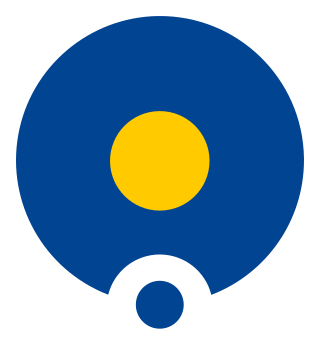Related Research Articles

Aleksander Wolszczan is a Polish astronomer. He is the co-discoverer of the first confirmed extrasolar planets and pulsar planets.
The German Research Foundation is a German research funding organization, which functions as a self-governing institution for the promotion of science and research in the Federal Republic of Germany. In 2019, the DFG had a funding budget of €3.3 billion.

The Polish Academy of Arts and Sciences or Polish Academy of Learning, headquartered in Kraków and founded in 1872, is one of two institutions in contemporary Poland having the nature of an academy of sciences.

The Foundation For Polish Science is an independent, non-profit making organisation which aim at improving the opportunities for doing research in Poland. Established in 1990, registered in 1991, the Foundation's mission is to provide assistance and support to the scientific community in Poland. The strategy of Foundation For Polish Science is to support research groups and individual scientists, realised through individual prizes, grants and scholarships awarded by FNP, including the Prize of the Foundation for Polish Science. Its effort is widely regarded as crucial in transforming Polish science after 1989.

Michał Kazimierz Heller is a Polish philosopher, theoretical physicist, cosmologist, theologian, and Catholic priest. He is a professor of philosophy at the Pontifical University of John Paul II in Kraków, Poland, and an adjunct member of the Vatican Observatory staff.

Gury Ivanovich Marchuk was a Soviet and Russian scientist in the fields of computational mathematics, and physics of atmosphere. Academician ; the President of the USSR Academy of Sciences in 1986–1991. Among his notable prizes are the USSR State Prize (1979), Demidov Prize (2004), Lomonosov Gold Medal (2004).

Nicolaus Copernicus University in Toruń or NCU is located in Toruń, Poland. It is named after Nicolaus Copernicus, who was born in Toruń in 1473.
Andrzej Jarosław Udalski is a Polish astronomer and astrophysicist, and director of the Astronomical Observatory of the University of Warsaw. He is also head of the Department of Observational Astrophysics at Astronomical Observatory, the head and project manager of the Optical Gravitational Lensing Experiment, and editor of the quarterly journal Acta Astronomica.
The Stockholm Prize in Criminology is an international prize in the field of criminology, established under the aegis of the Swedish Ministry of Justice. It has a permanent endowment in the trust of the Stockholm Prize in Criminology Foundation. The Stockholm Prize in Criminology is a distinguished part of the Stockholm Criminology Symposium, an annual event taking place during three days in June.
Stifterverband für die Deutsche Wissenschaft – or Stifterverband for short – is a registered not-for-profit association that is based in Essen and which also has a capital city office in Berlin. Its work is focused on education, science and innovation. The Stifterverband organisation analyses, advises, supports and networks science and business.

The Mustafa Prize is a science and technology award, granted to top researchers and scientists from the Organisation of Islamic Cooperation (OIC) member states. The prize is granted to scholars of the Islamic world as one of the symbols of scientific excellence in recognition of the outstanding scientists and pioneers of scientific and technological cooperation and development in the world. The science and technology $500,000 prize, Medal, and Diploma are awarded to Muslim researchers and scientists, regardless of whether they live in Muslim-majority nations or elsewhere, as well as non-Muslim scientists in Muslim countries. In 2016, science journal called the prize, the Muslim Nobel.

Katja Becker is a German physician and biochemist who has been serving as the president of the German Research Foundation (DFG) since 2020. She had previously been the organization's vice president from 2014 to 2019.
Marek Żukowski is a Polish theoretical physicist and lecturer at the University of Gdańsk. He specializes in quantum mechanics, his area of interest in particular concerns the Bell's theorem and quantum interferometry.
Jacek Antoni Błażewicz is a Polish computer scientist specializing in the theory of algorithms and bioinformatics. He has been working as Director of the Institute of Computer Sciences of the Poznań University of Technology. He is also Head of the Department of Bioinformatics at the Institute of Bioorganic Chemistry of the Polish Academy of Sciences.
Joanna Marszałek-Kawa is a Polish lawyer, political scientist, professor and lecturer at the Faculty of Political Science of Nicolaus Copernicus University in Toruń.
Ewa Kamler is a Polish biologist and ichthyologist, Professor of Natural Sciences specializing in the fields of ecology, hydrobiology and zoology.

The Department of Computer Science is a department of the Technische Universität Darmstadt. With a total of 36 professorships and about 3,700 students in 12 study courses, the Department of Computer Science is the largest department of the university. The department shapes the two research profile areas "Cybersecurity (CYSEC)" and "Internet and Digitization (InDi)" of the university.
Maciej Daniel Wojtkowski is a Polish physicist, specializing in physical optics and medical applications of optics, and founder and director of the International Centre for Translational Eye Research (ICTER) in Warsaw, Poland.
Andrés Fabián Lasagni is a scientist and laser expert. He is professor at the Technischen Universität Dresden and leads the Chair for Laser-based Manufacturing.
Adam Kanigowski is a Polish mathematician specializing in dynamical systems and ergodic theory. He is a professor at the University of Maryland.
References
- ↑ "The COPERNICUS Award" . Retrieved 2018-08-05.
- ↑ "Copernicus Award 2016" . Retrieved 2018-08-05.
- ↑ "Copernicus Award 2024 for Outstanding German-Polish Collaboration in Astrophysics". dfg.de/en. 22 May 2024. Retrieved 22 May 2024.
- ↑ "Copernicus Award 2022 for Outstanding German-Polish Collaboration in German Literary Studies". dfg.de. 28 April 2022. Retrieved 23 April 2023.
- ↑ "Przyznano Polsko-Niemiecką Nagrodę Naukową Copernucus 2020" (in Polish). Retrieved 5 August 2021.
- ↑ "Copernicus Award 2018 announced" . Retrieved 2018-08-05.
- ↑ "Copernicus Award 2016 announced" . Retrieved 2018-08-05.
- ↑ "PROF. MAREK ŻUKOWSKI, PHD HAB. – FNP PRIZE 2013 LAUREATE" . Retrieved 2018-08-06.
- ↑ "Outstanding German-Polish Scientific Cooperation" . Retrieved 2018-08-05.